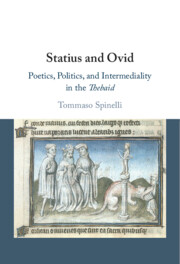Book contents
- Statius and Ovid
- Statius and Ovid
- Copyright page
- Contents
- Acknowledgements
- Note on Texts and Translations
- Abbreviations
- Introduction
- 1 The Post-Ovidian World of the Thebaid
- 2 Rewriting the Foundational Myths of Rome
- 3 Forging Divinity, Conceptualising Power
- Conclusion
- Appendix
- References
- Index Locorum
- General Index
3 - Forging Divinity, Conceptualising Power
Published online by Cambridge University Press: 25 March 2024
- Statius and Ovid
- Statius and Ovid
- Copyright page
- Contents
- Acknowledgements
- Note on Texts and Translations
- Abbreviations
- Introduction
- 1 The Post-Ovidian World of the Thebaid
- 2 Rewriting the Foundational Myths of Rome
- 3 Forging Divinity, Conceptualising Power
- Conclusion
- Appendix
- References
- Index Locorum
- General Index
Summary
In contrast with the emphasis put on pietas and providentia by Flavian discourse, the Thebaid is the only Flavian poem that begins and ends without gods, much like Lucan’s Bellum Civile. However, Statius’ gods are described in Ovidian terms and use thought-provoking allusions to the Metamorphoses to challenge the readers’ poetic memory with distorted versions of their literary past. The ways in which Statius and his gods allude to and manipulate the Metamorphoses’ divine narratives, reworking Ovid’s coded use of celestial geographies, both mark a significant distance from Lucan’s epic universe and highlight the Roman significance of the Thebaid’s divine world. The gods’ attempts to legitimise their morally dubious actions by manipulating the readers’ understanding of the Metamorphoses not only shows the Thebaid’s sophisticated engagement with the former literary tradition but also exploits the traditional analogy between heavenly and Roman power to reflect on the Flavian emperors’ progressive sacralisation of the imperial institution and selective renegotiation of Augustan legacy in the tense religious atmosphere of post–civil-war Rome.
Information
- Type
- Chapter
- Information
- Statius and OvidPoetics, Politics, and Intermediality in the <I>Thebaid</I>, pp. 187 - 249Publisher: Cambridge University PressPrint publication year: 2024
